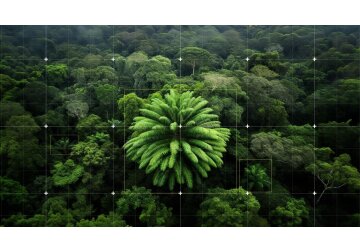
AI helping find 'world's loneliest plant' a partner
Artificial intelligence is being used in the hunt to find an endangered male plant, described as the world's loneliest, a female partner.
A research project, led by the University of Southampton, is scouring thousands of acres of forest in South Africa - where the only known Encephalartos woodii (E. woodii) was ever found.
All existing members of the species are male clones of the only known E. woodii, and cannot naturally reproduce.
The ancient species predates the dinosaurs, and is believed to be one of the most endangered organisms on the planet.
Dr Laura Cinti, research fellow at the University of Southampton, is leading the first project to use drones and AI to search for a female E. woodii.
She said: “I was very inspired by the story of the E. woodii, it mirrors a classic tale of unrequited love.
"I’m hopeful there is a female out there somewhere, after all there must have been at one time. It would be amazing to bring this plant so close to extinction back through natural reproduction.”
The only known E. woodii was discovered in the Ngoye Forest in 1895.
With only one male ever found, all subsequent propagated samples are male clones - meaning the plant cannot naturally reproduce.
Drone imaging of the forest is being analysed by AI - with less than 2% of the 10,000 acre area having been covered so far.
Dr Ciniti said: “With the AI, we are using an image recognition algorithm in order to recognise plants by shape.
“We generated images of plants and put them in different ecological settings, to train the model to recognise them."
The forest has never before been fully explored to determine if a female could exist.
The species is still grown and propagated at the Royal Botanical Gardens at Kew, in London, where they describe it as the "worlds loneliest plant"
bbc.com







